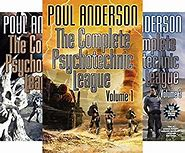Perhaps the simplest kind of narrative is: Guys fight. More specifically, in this case, a guy armed only with a wrench fights a guy armed with a rifle on a small asteroid. Solution: Flee; fly right round the asteroid and hit the other guy from behind. Fight won. Problem solved. Neat solution. Andersonian heroes are problem-solvers who usually have a moment of realization before implementing their solutions.
However, this story exists as part of a series. Lundgard's role is not only to fight on an asteroid but also to expound anti-psychotechnic Humanism. This Humanist is defeated but his samideanoj (Esperanto: "members of a group having the same idea") seize power between episodes and are overthrown in the next episode. (Or, at least, one character recounts his role during the anti-Humanist counterrevolution after the event.) As in Anderson's model, Heinlein's Future History, much occurs between episodes. In fact, Anderson's revolutionary Humanists exactly parallel Heinlein's revolutionary Angels of the Lord while also being completely different from them.
This holmgang is on an asteroid instead of on an island. Earlier, on a boomtown asteroid, Boot Hill had become Helmet Hill. Viking and Western narratives project their echoes into space opera.

1 comment:
Kaor, Paul!
Dang! I've forgotten that detail, that cemeteries on asteroids might be called "Helmet Hill" instead of "Boot Hill." Intriguing and it makes sense. A neat futuristic touch!
Ad astra! Sean
Post a Comment